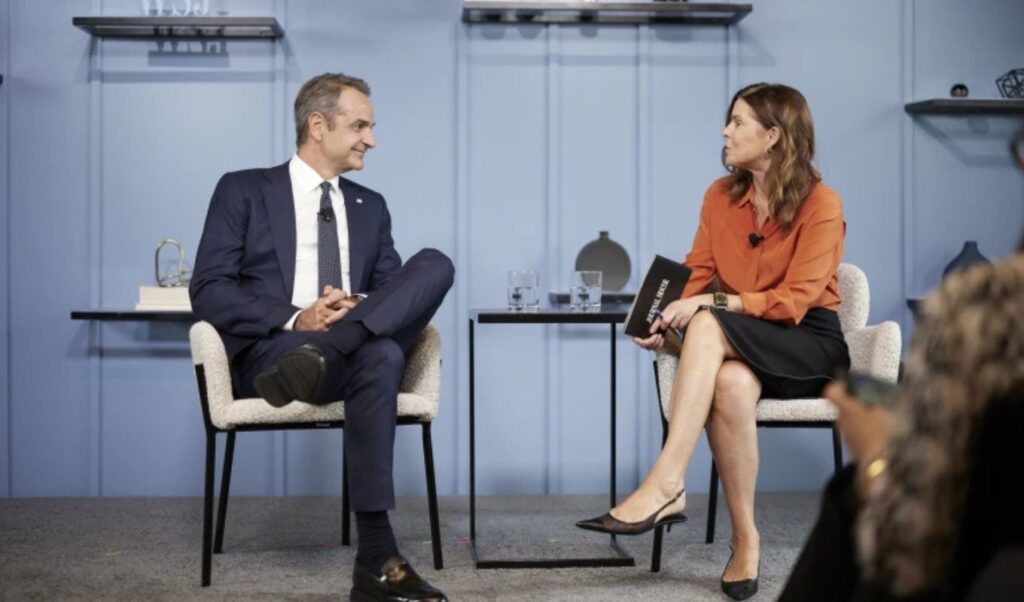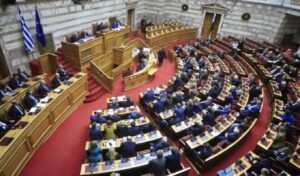Almost 24 hours after postponing his meeting with Recep Tayyip Erdogan, Prime Minister Kyriakos Mitsotakis sent a strong message to Turkey regarding Greece’s actions on hydrocarbon exploration in the Eastern Mediterranean. “Having an open channel of communication with Turkey doesn’t mean we agree with Turkey on all issues. If sometimes what we do causes some discomfort to Turkey, so be it. C’est la vie, as the French would say,” he said characteristically during his discussion with Wall Street Journal Editor-in-Chief Emma Tucker, on the sidelines of the High-Level Week of the 80th UN General Assembly in New York.
Read: Why the Mitsotakis-Erdogan meeting was postponed: The Turkish president’s messages from the UN – “Difficult to schedule the meeting”, government sources say
Full discussion between Kyriakos Mitsotakis and Emma Tucker follows
Emma Tucker: I look forward to discussing Greece’s fascinating economic journey and its interesting position in this fragile geopolitical world. But I’d like to start by saying that almost everyone I know, including myself, went to Greece this summer. It’s like saying: “Move over Italy, move over France. Everyone’s going to Greece.” I’m curious to know what you did to encourage this boom? And also, where did you go for your summer holidays?
Kyriakos Mitsotakis: “I vacationed in Greece. First of all, thank you. Thank you for choosing Greece for your holidays. You’re one of 36 million people who decided to travel to Greece. And of course, tourism is the largest sector in Greece. It’s not the only one, but it’s the largest sector. We’re particularly pleased that more and more people are choosing Greece, especially more from the United States. We had more than 100, I think, direct flights to Athens on a weekly basis from the US. We’ve penetrated the US market, and that’s very encouraging for Greek tourism.
When we think about tourism, the real challenge is balancing growth with sustainability and well-paid jobs, and also encouraging the new generation of Greeks to enter the services sector. I believe we’ve done quite a good job so far in terms of investments in high-end tourism. This is always a challenge, as we need to ensure that whatever is built or renovated meets very high sustainability standards. It’s not always easy, because the Greek brand was more associated with mass tourism. Certainly, mass tourism continues to be an important factor, but we really want to upgrade our product.
We want to open up new destinations. I was particularly pleased that you visited a place in northern Greece that isn’t particularly well-known. I’m very happy that more and more visitors are discovering mainland Greece and not limiting their Greek experiences only to Santorini and Mykonos. The challenge for us is to extend the season. We don’t want the tourist season to last only three months. This creates many seasonality problems. If you look, for example, at this year’s data, October appears to be a very good performing month. We’re extending the season until November and hope the season can start in March.
We’re promoting, of course, not only Athens but also some of our main cities, including Thessaloniki, which is the second largest city, as year-round destinations. It seems to be gaining great momentum. I’m satisfied with the results. I looked at the data through July. This will be a record year, not only in terms of arrivals but especially in terms of revenue. Tourism brings in more than 20 billion euros in revenue for the economy. This will be another record-breaking year.”
Emma Tucker: On the economy, where tourism plays a significant role, I’d like to talk about this impressive journey. Ten years ago Greece was on the brink of a massive bankruptcy and disorderly exit from the euro. Ten years have passed since then and now you have one of the fastest-growing economies in the EU. You have a budget surplus. My question is: has Greece “returned”?
Kyriakos Mitsotakis: “It has certainly returned. I believe all the data confirms it. But the journey and the story that Greece tells is, I think, important for a broader European, perhaps even global, audience. It’s an unconventional story, if you think about where we were. Ten years ago, the Greek 10-year bond yield was around 9.5%, while the French 10-year was at 1%. Today, Greece borrows cheaper than France and Italy, and few would have made that bet even two or three years ago.
So, in my opinion, this is a remarkable turnaround story. It’s a story that centers on macroeconomic stability. Greece achieves not only primary but also fiscal surpluses. In this sense, we are the exception to the rule in Europe. If you look at the number of countries currently under European supervision, that says a lot about the problems European economies face. We’re not in that position. We produce surpluses that allow us to further reduce taxes, support the middle class, and create a virtuous cycle where growth generates more revenue, which allows us to reduce more taxes again and invest in our public services.
I believe we’ve overcome the habits of the past. It took some difficult and painful reforms to achieve this. It’s always difficult to explain to citizens that you need to create a surplus because we need to reduce our debt. But if you look at the rate at which we’ve reduced our debt, it’s quite impressive. It’s the fastest improvement in the debt-to-GDP ratio among OECD countries, which is reflected in market treatment.
But it’s mainly investment-driven growth. It shouldn’t be consumption-driven growth. It’s also growth that slowly but steadily changes the very fabric of the economy, from an economy that was largely dependent on tourism to an economy that also attracts investments in other sectors where we have comparative advantage.
Over the past six years we’ve attracted foreign direct investment exceeding 30 billion, while over the past 20 years the corresponding number was below 30 billion. In five years we did better than Greece had done in 20 years regarding foreign direct investment. Challenges continue to exist that, of course, we need to address: improving productivity, addressing labor shortage challenges.
However, I prefer to have this problem rather than the opposite, because when I took over governing the country unemployment was at 18% and youth unemployment at 30%. Now unemployment is at 8% and employers tell me they can’t find skilled workers, while six years ago young people couldn’t find jobs.”
Emma Tucker: Undoubtedly the recovery was spectacular, but, as I understand, Greece’s GDP is still lower than 2008 levels. You’re still one of the poorest countries in the EU. There are two specific issues I’d like to raise that pose challenges. One is connected to the COVID recovery funds you received from the EU, which have been diffused into the economy, but I think they expire next year. That’s one challenge. The other, of course, is the tourism boom. It’s wonderful, but tourism is volatile, there’s still the element of increased post-pandemic tourism. How will you address these two challenges? Also, even if your recovery was excellent, the fact is that, structurally, the economy still has a way to go, based on some of these economic indicators.
Kyriakos Mitsotakis: “You rightly point out that we still have significant challenges ahead. I believe the comparison with 2008 statistics isn’t particularly relevant. Why? Because, if you look at the data before the bankruptcy, they didn’t really reflect the economy’s robustness since we eventually went bankrupt, because we were spending beyond our means. When they ask me about those indicators I answer, yes, but that was debt-fueled growth based on consumption, and we don’t want to return to those days.
So, yes, we’re closing the gap with Europe, and that was my main goal, convergence with Europe. To achieve this, we need to grow faster than the eurozone average. We also need to reduce income inequality. We focused heavily on the minimum wage. If you look at the minimum wage, it was 650 euros when I took over governance, now it’s 880 euros. So, we’re 11th in the EU ranking.
We have, therefore, clearly tried to focus on those struggling to make ends meet.
Now, regarding the challenges you highlighted, the COVID funds, what we call NextGenerationEU, have provided a great boost to the Greek economy, because they allowed us to invest in various critical sectors, but also to improve our public services.
Yes, the program expires in 2026, but there are still significant structural funds available for Greece and new funds related to climate change and social solidarity, which we can utilize. So, there won’t be a sudden cut-off of EU funds. But my main goal was to ensure we would absorb all the post-pandemic recovery funds and that they would really help us improve our competitiveness. I believe we’ve done a good job on that.
Now, returning to tourism, we’ve tried very hard to present to foreign investors a multi-sector economy. If you look at other sectors attracting foreign direct investment, this I believe demonstrates that Greece isn’t entirely dependent on tourism. Renewable energy sources, logistics and infrastructure, agri-food products and the agricultural sector. Greece exports agricultural products worth 8 billion euros and we still have significant room for improvement in addressing productivity problems in our agricultural sector. Health services, education. We’re opening the education space to non-profit, non-state investments. I look forward to Greece becoming a regional health and education hub.
And, of course, the technology sector. What’s happening in the technology sector is truly impressive. From the crisis emerged an ecosystem of new technology-oriented entrepreneurs who have achieved great things in Greece. The fact that we have a dynamic diaspora is a huge comparative advantage. I don’t want to refer to US domestic politics issues, but what I can tell you is that we’ve seen great interest from Greeks and Greek founders to bring their tech teams back to Greece, because we want to open our economy to foreign talent, but we want to do it in an organized and disciplined way.”
Emma Tucker: That’s an interesting thought. From what I understand, the technology sector represents about 3% of the Greek economy, and you’ve talked about increasing that percentage to 10%. How will this be achieved? It’s obvious that after the economic crisis there was a brain drain. Are you telling me that many young, dynamic Greeks who left for the US and founded their own companies will now return to Greece?
Kyriakos Mitsotakis: “What I’m saying is that for the first time we’re seeing more people returning to Greece than Greeks leaving Greece. We’re reversing the trend and that’s very encouraging.”
Emma Tucker: Are they all returning from the US?
Kyriakos Mitsotakis: “No. They’re returning from Europe, some of them are returning from the US. But what Greece now offers is good employment opportunities. I believe there’s an overall stable environment of political and economic predictability. If you want to take your family and return to Greece, that’s an important family decision on a long-term level. You want to be sure you’re doing the right thing.”
Emma Tucker: How long do you think it will take to get from 3% to 10%?
Kyriakos Mitsotakis: “It will probably take us a decade to achieve this. But what I see is an incredible appetite for technology investments. Major high-tech companies already have a presence in Greece. We’re an attractive destination for data centers. Currently, we’re building medium-sized data centers, but we’re also considering building giga data centers.
Additionally, the fact that we have exceptionally talented people certainly helps us promote Greece as an investment destination. If you look at the artificial intelligence ecosystem, Greece is overrepresented when we talk about AI scientists at top institutions. One of the reasons companies want to establish themselves in Greece is because they have access to excellent human capital.”
Emma Tucker: A common description of Greece is that it has a lot of bureaucracy. It takes a long time to get permits. I read somewhere that Microsoft needed four years to get a building permit for a data center it wanted to build. How do you address this specific problem?
Kyriakos Mitsotakis: “I believe it’s a fair criticism and we’re constantly working on reducing bureaucracy. I believe we’ve achieved significant improvements through digitizing the interaction between the state, citizens, and businesses. This is a very great success on the digital transformation front. It has also been recognized in Europe as an example of how one can make public administration more efficient.
Of course, artificial intelligence offers tremendous opportunities in terms of automating repetitive tasks and ensuring our civil servants focus on what’s really important. Naturally, there are many other challenges with artificial intelligence, but we’ve given great priority to how AI can improve governance work. We’ve established a special committee to examine these kinds of endeavors and we collaborate with all major companies interested in testing their ideas in Greece.
Yes, there’s still room for improvement regarding bureaucracy. But, for example, we just codified our construction legislation. This may sound like an insignificant process, but before this we had construction laws dating back 100 years. And now everything will be in one code.
These are the boring changes that actually make a big difference when it comes to doing business




